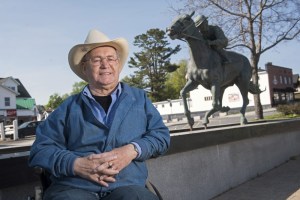
Jockey Ron Turcotte rides Secretariat during the 99th Kentucky Derby at Churchill Downs on May 5, 1973. Secretariat won the Derby, Preakness and Belmont in record times that still stand. (Bob Daugherty/Associated Press)
The first time Ron Turcotte rode Secretariat, he knew the horse was special. Maybe he didn’t know Secretariat would win the first Triple Crown in 25 years and set records in each race that still stand 52 years later, but he knew the horse could run. Turcotte knew it would be an honor to ride him. He called it love at first ride.
Turcotte died Friday in Drummond, New Brunswick, a village in his hometown of Grand Falls. He was 84. Canadian by birth, Turcotte was also an important member of the Van Buren community, the Aroostook County town on the New Brunswick border not far from Grand Falls.

Ron Turcotte poses next to a statue of him and Secretariat in Grand Falls, New Brunswick, Canada, May 31, 2023. Turcotte, who won the Triple Crown atop Secretariat, died on Friday. (Stephen MacGillivray/Associated Press)
In 1973, Turcotte rode Secretariat into history. You can watch the three Triple Crown races on YouTube. Each one is more impressive than the previous, culminating in the dominant effort at the Belmont Stakes. For the second half of the race, it looks like Turcotte and Secretariat are alone on the track. On the back stretch, Secretariat didn’t just pull away, he made the rest of the field vanish.
How dominant was Secretariat? ESPN included him on its list of the top athletes of the 20th century. There he is, ranked 35th, just behind Lou Gehrig and just ahead of Oscar Robertson. Turcotte was literally along for the ride.
In an interview posted at Secretariat.com, the website devoted to the horse that still sets the Triple Crown standard more than half a century later, Turcotte described what it was like riding Secretariat.
“I don’t know how to explain how it felt when he kicked into that extra gear, as they say, except to compare it to that feeling you get when you really press down on the accelerator and feel that immediate surge forward. You could really feel it,” Turcotte said. “There was no way to plan a strategy around his style of running. His stamina was also unbelievable. He could sustain a move for longer than any horse I’ve ever known, and he proved it in the Derby and the Belmont.”
That finishing kick is what defined Secretariat. Sprinters talk about maintaining that closing speed through the finish, and middle distance and distance runners talk about finding that extra something toward the end of a race to finish with zeal. Watch the three legs of the 1973, and you’ll see Secretariat redefine finishing speed.
The Kentucky Derby. Secretariat finds that extra gear down the stretch, pulling away for the win in 1:59.40, the first horse to crack the 2-minute mark in the race.

Jockey Ron Turcotte walks Secretariat toward the winner’s circle after they captured the Triple Crown by winning the Belmont Stakes on June 9, 1973. (Associated Press file photo)
The Preakness Stakes. Secretariat is actually in last place at the first turn. Then, he and Turcotte get to the outside and make a move into immortality. By the final turn, they’re in the lead and pulling away. Turcotte called the Preakness his favorite leg of that Triple Crown run.
“Everyone seems to be afraid of the first turn at Pimlico (the Baltimore home of the Preakness). If you get caught on the outside, you could end up in the neighborhood parking lot,” Turcotte said. “But I was familiar with the horse and with the track, and I’d made that move before when I rode at Pimlico regularly in 1963 and 1964… In the Preakness, they tried to slow the pace. It was my chance to surprise the rest of the field and catch everyone sleeping.”
In 2012, Secretariat’s Preakness time was finally corrected to 1:53.
The Belmont just wasn’t fair. Turcotte knew what Secretariat could do, and it was time to show it off.
“Secretariat has the most even and kind disposition of any horse I ever knew. He was even tempered and always ready to respond to whatever move you asked of him. He was bold without being aggressive,” Turcotte said.
If those three races in 1973 were all Turcotte accomplished, his legacy would be solid. He did so much more. An accident in 1978 left Turcotte paralyzed from the waist down, he became an lifelong advocate for disabled jockeys. Last month, Maine Gov. Janet Mills presented Turcotte with a state proclamation in honor of his career and ties to Maine. In places like Van Buren and Grand Falls, the border is thin. Communities are intertwined in ways those who divide us for petty reasons and division’s sake can’t comprehend. Maine mourns the loss of Turcotte along with New Brunswick.
In 2015, Grand Falls unveiled a statute of Turcotte and Secretariat crossing the finish line at the Belmont. Secretariat is looking straight ahead as if he could race forever. Turcotte’s head is turned to his left glancing at their time, 2:24, and knowing what they had accomplished was forever.

We invite you to add your comments. We encourage a thoughtful exchange of ideas and information on this website. By joining the conversation, you are agreeing to our commenting policy and terms of use. More information is found on our FAQs. You can modify your screen name here.
Comments are managed by our staff during regular business hours Monday through Friday as well as limited hours on Saturday and Sunday. Comments held for moderation outside of those hours may take longer to approve.
Join the Conversation
Please sign into your CentralMaine.com account to participate in conversations below. If you do not have an account, you can register or subscribe. Questions? Please see our FAQs.